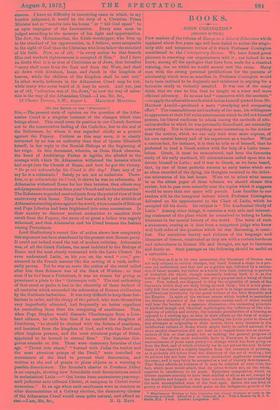[TO THE EDITOR OF THE SPROTATOR.1
Sun,-The present state of opinion on the question of the Atha- nasian Creed is a singular instance of the changes which time brings about. This creed owes its position in our Church Services not to the conservative feeling of the Catholics, but to the zeal of the Reformers, by whom it was regarded chiefly as a protest against the Papacy. Curious as this may seem, it is clearly intimated by no less an authority than that of Queen Elizabeth herself, in her reply to the Romish Bishops at the beginning of her reign. In this document, wherein, as Dean Hook observes, the hand of Archbishop Parker is legible, she alluded to the courage with which St. Athanasius withstood the heresies which had crept into the Church of Rome, and how he got the victory. " Do ye not acknowledge his Creed to this day ? Dare any of ye say he is a schismatic ? Surely ye are not so audacious. There- fore, as ye acknowledge his Creed, it shows he was no schismatic. If Athanasius withstood Rome for her then heresies, then others may safely separate themselves from your Church and not be schismatics." The Reformers regarded most subjects from the point of view of their controversy with Rome. They had been struck by the attitude of Athanasiusatanding alone agai nst the world, when councils of Bishops and Pope Liberius had been frightened into some concessions. In their anxiety to discover ancient authorities to sanction their revolt from the Papacy, the name of so great a father was eagerly welcomed, and thus Athanasius and his Creed became the fashion among Protestants.
Lord Shaftesbury's recent line of action shows how completely this argument has been abandoned by the present anti-Roman party. It could not indeed stand the test of modern criticism. Athanasius was, of all the Greek Fathers, the most indebted to the Bishops of Rome, and the most closely connected with the Latin Church. He even understood Latin, as his pun on the word " cras," pro- nounced in the French manner like the cawing of a rook, suffici- ently proves. Yet he was no more the author of the creed called after him than Solomon was of the Book of Wisdom ; so that even if he had been a Protestant, it was no reason for giving so prominent a place to the " Quicunque vult." The real authorship of that creed or psalm is lost in the obscurity of those darkest of all centuries which succeeded the subversion of Roman civilisation by the Northern barbarians. It was very difficult to keep those bar- barians in order, and the clergy of the period, who were themselves very imperfectly educated, had frequently no better expedient for controlling them than the composing of anathemas. Thus, when Pope Stephen would dissuade Charlemagne from a Lom- bard alliance, be tells him that if he married the daughter of Desiderius, "he should be chained with the fetters of anathema, and banished from the kingdom of God, and with the Devil and other impious persons, and the most atrocious pomps of Satan, appointed to be burned in eternal fires." The historian Gre- gorius remarks on this. These were customary formulas of that age. "Thrust into chaos," "burned with Judas the traitor and the most atrocious pomps of the Devil," were inscribed on monuments of the dead to prevent their desecration, and written at the end of grants to pious objects as a warning to possible disendowers. The founder's charter to Evesham Abbey is an example, showing how formidable such denunciations sound in ecclesiastical Latin :—" Qui locum hullo contaminare prassump- sedt judicetur ante tribunal Christi, et nunquam in Christi veniat memoriam." In an age when such anathemas were as common as altar denunciations at a Galway election, the damnatory clauses of the Athanasian Creed would seem quite natural, and offend no


































 Previous page
Previous page